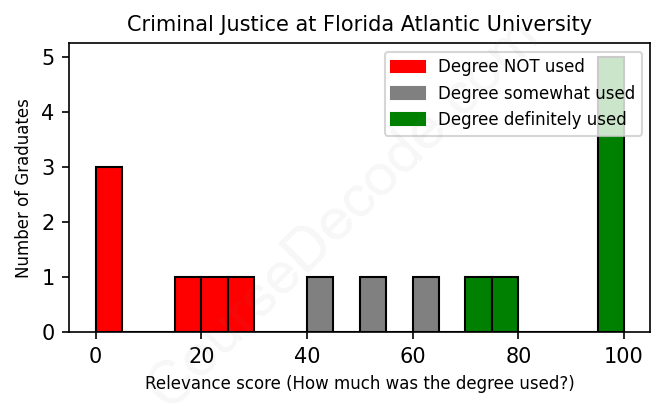
First, some facts. Of the Criminal Justice graduates from Florida Atlantic University we've analyzed , here's how many have used (or NOT used) their degree in their career:

These are estimates based on AI analysis of 16 LinkedIn profiles (see below).
The verdict? Significantly below average. Overall, with an average relevance score of 54%, Criminal Justice graduates from Florida Atlantic University have a much lower likelihood (-13%) of finding work in this field compared to the average graduate across all fields:
And for comparison, here's the chart for all profiles we've looked at across all degrees.
Also, after graduating, only 25% of these graduates have pursued further education other than another Bachelor's degree (such as a Masters degree or other), compared to the average across all profiles of 35%. This suggests a Bachelors degree is enough for most Criminal Justice graduates, and it's normal to look for work straight after graduation.
See the details:
|
Relevance score: 100% We think this person has gone into a career highly relevant to their degree. We think this person has gone into a career highly relevant to their degree.
DEGREE INFOGraduated in 2011 from Florida Atlantic University with a Bachelor's degree in Criminal Justice. No other secondary education since. JOB HISTORY SINCE GRADUATIONChild Protective Investigator Florida Department of Children and Families Aug 2014 - Jul 2017 LEO  Palm Springs Police Department Jun 2017 - Present ABOUTNo information provided. |
The top 10 most common jobs done by the graduates we've analyzed (ranked most common to least) are:
When looking at the kinds of jobs people with a Criminal Justice degree from Florida Atlantic University have landed, it’s a mixed bag. A lot of graduates have found themselves in roles like guest service agents or marketing specialists, which don’t really connect to criminal justice or use the skills one might expect from that degree. You’ve got a bunch working in human resources, as corporate recruiters or benefits consultants, where they’re mostly focusing on employee management rather than law enforcement or legal processes. Some roles, like office managers at law firms, might brush against criminal justice concepts but still lean more towards admin work than actual legal action.
However, there are some bright spots! Certain graduates have indeed stepped into roles that are super relevant to criminal justice—like child protective investigators, police officers, and legal assistants—where they actively apply what they’ve learned in their schooling. These jobs directly engage with legal procedures, child welfare, and law enforcement principles, highlighting the practical side of their degree. So, while many graduates have gone into unrelated fields, there are definitely those who found fulfilling careers that make the most of their criminal justice education. It really just depends on the individual's career path and interests.
Here is a visual representation of the most common words in job titles for Criminal Justice graduates (this is across all Criminal Justice graduates we've analyzed, not just those who went to Florida Atlantic University):

When you look at what graduates from Florida Atlantic University with a degree in Criminal Justice have been up to, you see a pretty mixed bag. For a lot of them, their first jobs after college don’t directly tie back to Criminal Justice. You’ve got people starting off as guest services agents, technical support specialists, and even in marketing roles. It seems that a chunk of these grads wind up in positions that are more customer-facing or administrative rather than field-related jobs like law enforcement or legal work. However, there are some who do land decent starting positions in relevant areas, such as Child Protective Investigator roles or internships at law firms.
Fast forward five to ten years, and you see some graduates moving into more solid roles in their fields. A few have established careers in law enforcement or legal services, like those who became police officers or legal assistants at respectable firms. Others took a different path, ending up in areas that, while not always directly related to Criminal Justice, leverage their skills—like staffing and human resources or even marketing. It's clear that some graduates have found good jobs and forged successful paths, while others seem to have veered off into positions that don’t connect back to Criminal Justice. It’s a reminder that there’s no one-size-fits-all trajectory, and some grads might need to branch out a bit before landing where they want to be.
Honestly, getting a Bachelor’s degree in Criminal Justice at Florida Atlantic University is pretty manageable for most students, especially if you’re motivated and interested in the subject. The coursework generally covers a mix of theory, concepts, and practical applications, so if you're someone who enjoys learning about law, psychology, and sociology, you’ll likely find it engaging. While there are definitely challenging moments, it’s not considered one of the hardest degrees out there. Like any degree, it requires effort, but if you stay organized and keep up with your assignments, you should be able to handle it just fine!
Most commonly, in the LinkedIn profiles we've looked at, it takes people 4 years to finish a Bachelor degree in Criminal Justice.
From the job histories of these Florida Atlantic University Criminal Justice grads, it seems like they’ve had a pretty mixed bag when it comes to earnings. Some have moved into roles that typically pay well, like corporate recruiter or benefits consultant, which suggests they’re probably making decent money now—especially the ones at NextEra Energy and Florida Power & Light. Others, though, like a lot of those in law enforcement or entry-level positions, may not be raking it in as much. There are also those who have dipped into various jobs with lower pay like retail or support roles, which aren't known for their high salaries. Overall, it looks like some graduates are doing quite well, while others might be in the lower end of the pay scale. So yeah, it really depends on the path they chose after graduation!
Here is a visual representation of the most common words seen in the "about" section of LinkedIn profiles who have a Bachelor degree in Criminal Justice (this is across all Criminal Justice graduates we've analyzed, not just those who went to Florida Atlantic University). This may or may not be useful:

Here are all colleges offering a Bachelor degree in Criminal Justice (ordered by the average relevance score of their Criminal Justice graduates, best to worst) where we have analyzed at least 10 of their graduates: